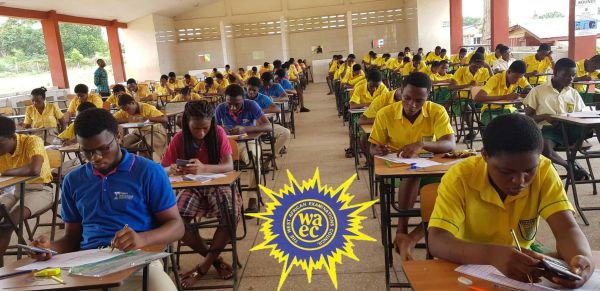The Executive Director of Africa Education Watch (Eduwatch), Kofi Asare, in response to the outcry of the West African Examinations Council (WAEC) over the increasing trend of impersonation in the schools’ exams, indicated that the lack of capacity on the part of the council to address ‘secondary examination fraud’ loopholes is the main cause of the current menace.
He explained that there are two sources of exam fraud: Primary (outside exam centre) which involves leakage of examination questions during printing and transportation to regions, districts and schools. And Secondary (exam centre) which involves exam room copying from foreign materials on paper or via WhatsApp platforms, arranged mass cheating with the support of supervisors, and impersonation.
“All sources have monetary value and constitute a business to teachers and other agents. WAEC has strengthened efforts to block the primary source by using BNI to supervise the printing and transporting of questions, hence, pushing all actors to the exam centre.
“The change in dimension requires external supervisors at every centre, whether with the use of BNI or WAEC supervisors. However, WAEC cannot deploy 775 supervisors to all 775 centres for all papers,” he said.
He added further that even if WAEC had the capacity, some external supervisors will be compromised, as has been the case, albeit a small number.
He therefore proffered the use of technology in the medium term by installing closed-circuit television (CCTV) cameras at centres during exams.
WAEC expresses worry over increasing impersonation cases recorded in schools WASSCE 2022
The West African Examinations Council (WAEC) has expressed worry over the number of impersonation cases thus far in the ongoing West African Senior School Certificate Examination (WASSCE) for Ghanaian school candidates only.
According to the examination body, the practice is very disturbing and unacceptable as the schools’ examination is individual schools based – which means that the management of schools is supposed to know and identify every candidate before entry into the examination hall.
WAEC stated that it has reported 23 suspected cases of impersonation in the ongoing West Africa Senior School Certificate Examination (WASSCE) to the Police, adding that such cases have been on the increase in this year’s examination because school authorities fail to identify those ‘unwanted’ individuals in the exam halls.
The schools involved in this practice included Prince Boateng SHS – Nsawam, with 15 incidents; Vicar Trust SHS – Kasoa, with three cases; St. John SHS – Asante Bekwai, with two cases; while Winners SHS – Nkawkaw, Sunyani Business College, and Mococo SHS – Nkawkaw all recorded an incident each.
Head of Public Affairs, Agnes Teye -Cudjoe, urged school authorities not to condone these malpractices, but help the council to fish out any impersonators even before they are allowed into the examination room.
She added that there are several syndicated cheating cases in schools where teachers extort money from candidates and provide answers to them in the examination halls.
“The practice involves the collection of monies from candidates by teachers, and execution of pre-arranged plans by these same persons who assist candidates to cheat by solving questions and distributing photocopied/printed solutions to the candidates,” she said.
Furthermore, she stated that the council has also noticed a trend of some persons snapping some papers during the examination and forwarding same to some Telegram channels for solutions to them.
She explained that, for instance, Graphic Design Paper two was tracked to Sandema SHS, Upper East Region, and the candidate has been arrested and processed for court. Additionally, the ‘Management in Living’ paper was also tracked to Catabb SHS, Kumasi, where investigations are ongoing to arrest the perpetrator.
On the Smuggling of mobile phones into the examination halls by the candidate and some invigilators, Mrs. Teye-Cudjoe said during Government 2 and 1 paper, an invigilator was caught with a mobile phone assisting a candidate at Ideal College, Kasoa.
She mentioned that there is a scheme where candidates pay money to teachers/school authorities to induce supervisors and invigilators to compromise and predetermined arrangements to have subject tutors solve questions and distribute answers in various forms to candidates.










